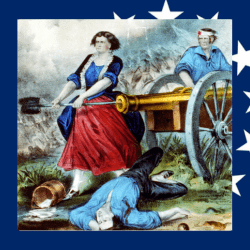
Beginning during the American Revolutionary War and continuing through to today, there has been an elusive legend of a symbolic heroine named “Molly Pitcher” who fought for American independence and stood for the thousands of nameless women who similarly dedicated themselves to the rebel cause. Because the legend is somewhat ill-defined, multiple women have been proposed as the inspiration for it, but no other makes a case as strong as Mary Ludwig Hayes.
Mary Hayes was born October 13th, 1754 in either Pennsylvania or New Jersey; the uncertainty of the location is reflective of the poor records kept during the creation of the United States. Regardless of the exact location of her birth, Mary was an American through and through.
At the age of 20, Mary was forced to confront military life directly following her marriage to a soldier, William Hayes. She accompanied him to the camps at which he was stationed, learning basic first aid and working with other women to care for wounded soldiers.
The name “Molly Pitcher” may appear to have originated out of nowhere, but knowing the duties and name of Mary, it can be broken down to make much more sense. The first name, Molly, could have simply been a nickname for Mary as the two sound quite similar, and Pitcher perhaps refers to water jugs women would carry around for cleaning around the Continental Army camps. It makes sense, then, that Mary Ludwig Hayes could very well be the inspiration for the American myth.
Mary did not only earn her fame by working in the infirmary or by washing clothes, however. She also gained notoriety for her fiery temper and boisterous personality when working with male troops. She never let herself be intimidated by someone just because they were a man, and many recall that as an impressive feature unique to her within the camps she served at.
The most famous element of her legacy, however, reportedly arose when she did something outside the normal scope of her duties. Though always known for being brave, Mary exceeded expectations during the Battle of Monmouth, when she was only 24 years old. The Revolutionary troops were under attack, and instead of sitting idly by, she allegedly took over a cannon and began firing at the British.
Though Mary’s story closely mimicks those of some other women, there is strong reason to believe that she in fact is the true inspiration for “Molly Pitcher.” In some ways, however, the unknown nature of who Molly Pitcher may have been serving as a reminder of the many women who served during the American Revolutionary War and prompts us to think of the many brave heroines who fought for America’s future.
